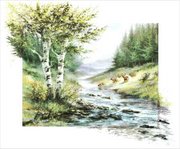First published June 19, 2006 at www.thepartialobserver.com
Geography literacy has been at an abysmal low in the United States. National Geographic and the Association of American Geographers have been putting much effort in getting better teaching methods and materials for classroom teachers. However, teacher training does not teach teachers about geography. Social Studies teachers are resistant to teaching geography as a stand alone subject. Therefore, we need to make geography pop and make it a cool subject to take. By the time I graduated from high school, I had been indoctrinated with geography. When I entered college geography was subject material that I knew about and I took courses because I wanted to know more.
To define geography we find that it is a social science that focuses on the spatial distribution of human and physical phenomena; the study of the physical world, its inhabitants, the interaction between the two, and the patterns and systems involved; the world and all that is in it; the study of pattern and processes associated with the earth; the study of relationships between humans and their environment by emphasizing a spatial and environmental perspective at a variety of scales; a spatial discipline---it is a perspective that seeks to understand patterns on Earth and the processes that created them; the study of humans interacting with their environment including the physical environment, the built environment and socially constructed spaces; and a spatial perspective of all human and physical phenomena.
You can see that the word "spatial" appears in these definitions or is implied in all of them. Geography is concerned with where and why things are located as they are. It is concerned with the patterns of phenomena and the processes that created them. Therefore, there is no special or specific subject matter, which it studies, but rather its subject matter is Earth.
To specifically serve the teacher population, a publication entitled Guidelines for Geographic Education was published in 1984 and its contents became known popularly as the "Five Themes of Geography." These themes are:
LOCATION (absolute or relative)
PLACE (human and physical characteristics, as well as images);
HUMAN/ENVIRONMENTAL INTERACTION (Humans adapt to the environment, modify the environment, depend to the environment)
MOVEMENT (includes the movement of people, goods, and ideas);
REGIONS (Formal Regions : i. e. United States, Birmingham, Brazil), (Functional Regions: i. e. a newspaper service area or franchise area. If the function ceases to exists, the region no longer exists.), (Vernacular Regions are those loosely defined by people's perception (i. e. The South or The Middle East).
Matt Rosenberg host of the online About.com Geography Guide is one of the outstanding geographers in the United States. Matt volunteered to host this site and it has been very successful. In a weekly newsletter, Matt tells about new information that is available on the internet to learn more about geographic information. This site makes serious comment about geography education and pokes fun at the lack of knowledge. in Matt's newsletter this week were the top ten reasons to study geography:
10. You'll know the way to San Jose.If you want to understand more about geography education look to the National Geographic's web site and Matt Rosenberg's site.
9. History will make a lot more sense.
8. You'll actually know where those coffee beans come from!
7. One of the most admired women in history, Mother Teresa, was a geography teacher.
6. Michael Jordan was a Geography major at UNC so you can be like Mike and make millions of dollars.
5. You might get to meet Alex Trebek.
4. You won't buy an Amtrak ticket from California to Hawaii.
3. You will be able to "find your way out of a paper bag."
2. You can catch Letterman's geography mistakes.
1. "Lost"? No way!
Just remember if you think the Bermuda Triangle is a percussion instrument in a reggae band…you may need to study geography. If you think the Equator is a cartoon action figure… you may need to study geography...
Geographers are spatial people...Thanks to Matt Rosenberg, Jeff Foxworthy, and David Letterman.



No comments:
Post a Comment